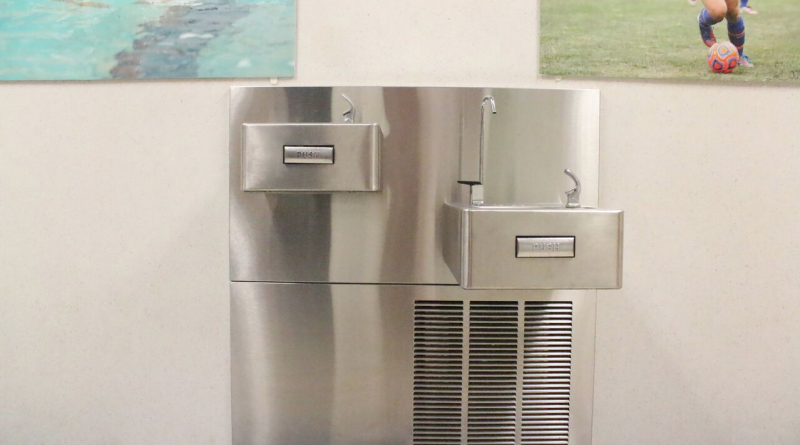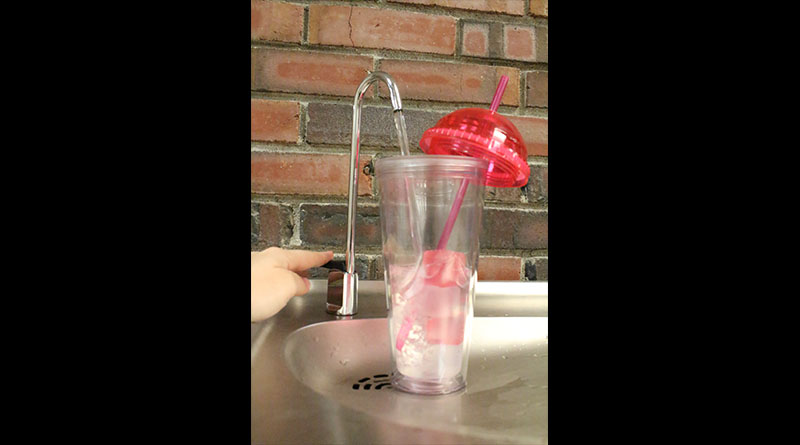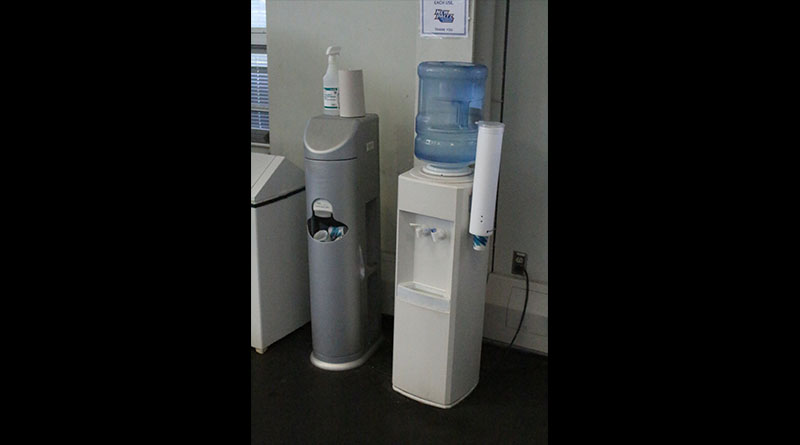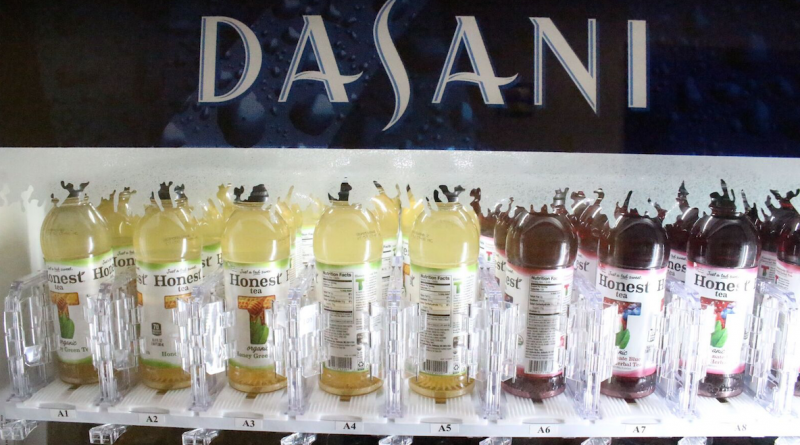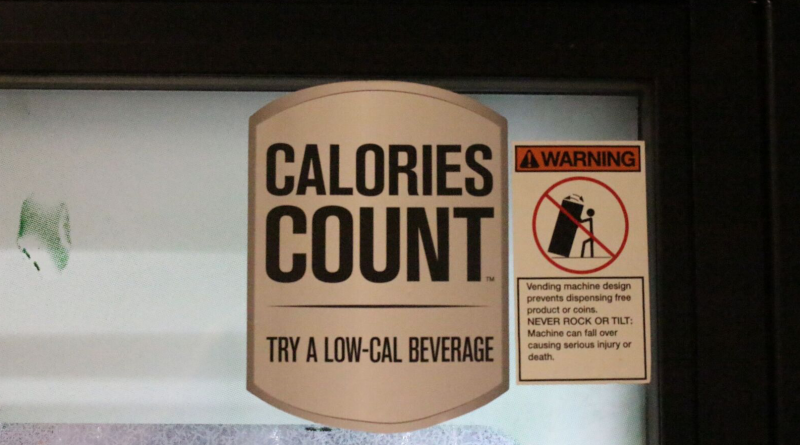A student sits inside the Lecture Center, trying to focus on the notes he takes when the quench for thirst hits him. He reaches into his bag to pull out a reusable water bottle, but it’s empty and the nearest water fountain is on the other side of the building. He would have grabbed a bottle of water at Starbucks on his way to class, but that’s no longer an option.

SUNY New Paltz announced at the end of the Spring 2015 semester that they would stop the sale of bottled water in an attempt to sell fewer plastic bottles, and the effects of the ban are being felt this semester. Campus Auxiliary Services (CAS) passed the ban in an effort to reduce its carbon footprint.
The idea arose as a possibility three years ago, but an ongoing contract with Pepsi kept the CAS board from taking action until a new contract with Coca-Cola was signed. The vote was unanimous.
Since the announcement, the CAS board, which controls the sale and distribution of bottled beverages on campus except for the Athletic and Wellness Center (AWC) and a select few other places, has done little retraining to make sure the ban has a smooth transition.
During the Fall 2015 semester, students and faculty have had mixed feelings about the ban. Bottled water may no longer be sold, but the sale of bottled soft beverages and energy drinks are still allowed.
“You know an argument has been made ‘look we’re already selling bottled beverages on campus what’s the big deal if we also continue to sell water?’ The difference is you can get really high quality water from the tap here on campus,” said Steven Deutsch, CAS executive director.
The SUNY New Paltz campus used to sell numerous cases of water a year, according to Deutsch. Last semester alone, from Jan. 1 until June 30, a total of 18,204 water bottles were sold as well as 112,985 bottled beverages beside water in CAS retail locations. Since Aug. 1, only 36,570 bottled beverages have been sold in these same locations. This doesn’t include vending machines found at different locations around campus, according to the CAS sales reports.
It costs $28 to buy reusable bottles on campus, which comes with a program run by Coca-Cola that allows students to refill their drinks. Unlike the option of purchasing a single use cup that you can scan and only fill once. The program gives students access to all the franchise machines on campus, according to Deutsch.
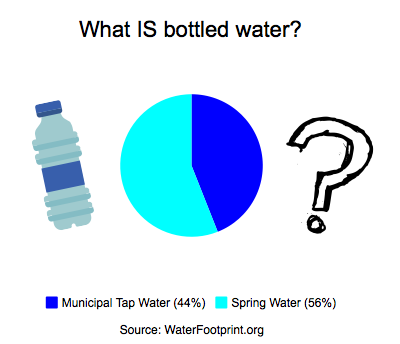
If that’s too much, a student can always buy their own reusable bottle and fill it up at one of the fountains on campus equipped with water bottle spouts, which were added to allow simpler access to refill water bottles.
When the water bottle ban was being implemented on campus and product changes were being made, Smart Water was first introduced in the vending machines. Smart Water is vapor distilled water that, unlike other water, contains electrolytes. Then CAS realized that Smart Water is still water and pulled it off the shelves.
No access to bottled water at times has left students questioning the choice of a healthier lifestyle, according to Joanna Cincotta, a fourth-year Anthropology major.
“The frustrating part is I’m always running around I don’t always have time to remember a water bottle and the other day that really messed me up,” Cincotta said.
Many students, like Cincotta, choose to drink water over other beverages on campus. The first thing on their mind in the morning after they turn on the coffee pot, is focused on what books they need to bring to class and not a water bottle.
Other students spend their entire day in classes, where an alternative drink like green tea or coffee would suffice, but then become involved in other activities where they need water. Chloe Cote, a fourth-year digital media production student, is also involved on the SUNY New Paltz Warriors dance team. They practice four nights a week in the AWC.
“There aren’t a lot of options for water fountains and a lot of the girls don’t like to use them because it’s a hassle for all of us to share one fountain at a time if we forget water bottles,” said Cote.
The Warriors dance team are few of the many students that pass through the Elting Gym as part of their daily routine.
Both the cardio and weight lifting wings of the gym have their own water dispensers while everywhere else in the gym has a water fountain nearby. Since vending distribution in the AWC is run by CAS, plastic water bottles are not for sale. Most people that go to the gym carry their own refillable bottles, as part of their culture and routine, explained Athletic Director Stuart Robinson.
Sporting events create another concern. The athletes always carry water in five gallon jugs to all of their games, and inside the gym there are vending machines that supply PowerAde or Vitamin Water, but there are no water bottles for the spectators. There haven’t been complaints, Robinson said, just a question of “why” that he is always answering.
“I don’t think anybody should fall out or become ill because they weren’t able to stay hydrated, so there should be some flexibility on that end,” said Robinson.

According to Robinson, CAS should consider this matter an opportunity to maybe sell nicely designed water bottles in the gym that can be refilled at the fountains. That way the policy is enacted, but with an alternative for spring sports when a heat wave comes in.
Robinson said he’s seen an increase in the use of refillable water bottles on campus and he supports the idea.
Along with sporting events there are lectures and catered events, that offer glasses of water rather than water bottles. The push for a change is not to seek financial gain or to promote the sale of sugary, caffeinated products; the regulation is merely an environmental change and a lifestyle change, according to CAS.
“I feel like this is something, as a campus, we should try and that we should try to push people into better habits, and not rely on water bottles,” Deutsch said. “I think that it’s a pain in the neck to have and maintain and clean a water bottle but it’s cheaper, it’s healthier, and it’s better for the environment.”
Reusable water bottles replacing plastic water bottles is just the beginning in an attempt to create a healthier, less wasteful lifestyle on the SUNY New Paltz campus by pushing students to go green.
CAS will take a look at how this policy is working at the end of the 2015-2016 academic year. If it has run well without many complaints, then CAS expects it will continue. Water bottles are the easiest to begin a policy like this with, but maybe one day the policy will ban all plastic bottles in general.
